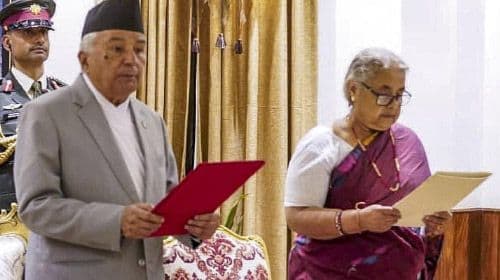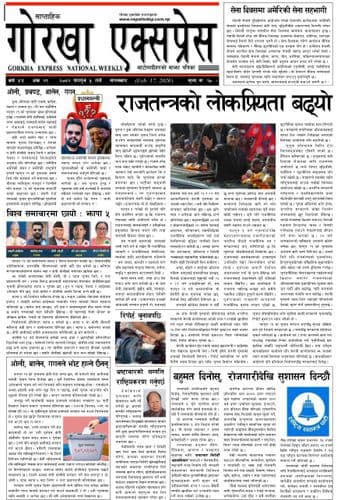
Nepal’s political crisis is not just a failure of leadership—it’s a failure of structure. Unless internal party democracy is guaranteed through a constitutional Party Bill of Rights, Nepal’s democracy will remain hostage to authoritarian party heads—and another uprising, perhaps led by Gen-Alpha in a few years, cannot be ruled out.
*******************************************************************
As Nepal tries to crawl past the fires of September 8th and 9th, 2025—now known as the Gen-Z Movement, the third such uprising since 1990—two interviews have captured the public’s attention.
One of them, aired on the 7th, a night before the demonstrations, featured a mild-mannered Gen-Z figure, Miraj Dhungana, who introduced himself as a coordinator in conversation with interviewer Diwas Bhandari of Buland Sanchar. Since then, Dhungana has disappeared from the limelight. Many of us, myself included, first came to understand the peaceful Gen-Z movement through him and its core demands: an end to corruption, a stable government, and the direct election of the executive head.
While other groups with similar fervor for change continue to emerge, the story of Gen-Z is still unfolding—embraced by many as a broader idea rather than a singular organization.
Listening to widespread sentiments across Nepali society, it’s clear that the idea of Gen-Z now represents something much larger: anyone disillusioned by how political parties have mismanaged statecraft and allowed corruption to fester over the past three decades with impunity. For many, it has become a symbol of collective frustration—and of a deep, long-standing desire for structural reform, which includes many priorities, but one in particular that is the focus of this article.
Originally seen as a youth-driven protest, the movement now seems to have transcended age. Gen-Z has come to embody the voice of anyone who dares to speak out against government dysfunction. It’s akin to the iconic scene in the classic tale of rebellion, when enslaved men rise and declare, “I am Spartacus”—a defiant act of solidarity in the face of Roman authoritarian cruelty. In that same spirit, Nepalis across generations are rallying around Gen-Z’s sacrifice and message, while firmly rejecting any incitement to violence in their name.
Party Autocracy Exposed
But the focus of this article is the astonishing and gradually unfolding revelations—shared through a series of video statements—by Nepali Congress General Secretaries Gagan Thapa and Bishwa Prakash Sharma in the aftermath of those deadly days.
They spoke candidly about their efforts—and ultimate failure—to persuade their party president and former PM Sher Bahadur Deuba, to withdraw from the ruling coalition, especially after the tragic deaths of several young protesters on the 7th. They even apologized to the public—and to Gen-Z in particular—for their failure and helplessness. A few other senior leaders, such as Dr. Shekhar Koirala and Dr. Chandra Bhandari, had also raised their voices leading up to the calamities of the 7th and 8th.
This raises a critical question: How was a single party leader able to override the overwhelming consensus among senior party leaders, particularly at a moment when the country was teetering on the edge of collapse?
The answer lies in the deeply undemocratic structure of party operations, where near-total authority rests in a single individual. There is no meaningful mechanism for internal debate, dissent, or checks on power—only loyalty to the top.
And the problem isn’t limited to just one party. The UML and Maoist Centre exhibit similar traits—party presidents with unquestioned control, central committees reduced to rubber stamps, and senior leaders routinely sidelined, silenced, or expelled. Other smaller parties show similar tendencies.
A Systemic Crisis of Democracy
Why do these leaders continue to wield such unchallenged power? The issue is systemic. It’s fueled by rent-seeking opportunities, control over resources, favors, lucrative appointments, and protection—tools used to build influence and secure internal coalitions. I’ve written about this elsewhere. But going deeper, it ultimately stems from the absence of internal democracy in nearly every major political party in Nepal. I offer a constitutional provision later along with some examples form other countries.
At the heart of this crisis lies a truth we’ve ignored for far too long:
You cannot expect a healthy democracy in the country when political parties themselves operate like autocracies.
That’s where I now turn my focus—to the urgent need for internal party democracy as the first and most necessary reform. Because if there’s anything the Gen-Z Movement has made clear, it’s this: real democratic change must start at the source of power—and that means inside the parties themselves.
In fact, the guarantee of democratically-run party structures must be enshrined in the Constitution itself—not left to the discretion or goodwill of individual party heads. This is one of the key lessons from the last 30 years in Nepal, which have seen as many governments as years—often rotated in musical-chair fashion among the same three party leaders, some of whom have served half a dozen times. Anyone daring to raise their voice is either kicked out, silenced, or sidelined.
This time, the Gen-Z Movement succeeded in dislodging that cycle, leading to the formation of an interim government with a mandate to probe the events of the 7th and 8th, investigate corruption, and—most importantly—hold parliamentary elections within six months.
What Other Democracies Have Done
Other countries have faced similar challenges with undemocratic behavior and authoritarian tendencies within parties—and have responded by embedding internal democracy into their constitutions.
Germany – Basic Law, Article 21 (1949, rev. 2024)
“Political parties shall participate in the formation of the political will of the people. They may be freely established. Their internal organization must conform to democratic principles. They must publicly account for their assets and for the sources and use of their funds.”
“Parties that, by reason of their aims or the behavior of their adherents, seek to undermine or abolish the free democratic basic order… shall be unconstitutional.”
Spain – Constitution, Section 6
“Political parties are the expression of political pluralism… Their internal structure and functioning must be democratic.”
Looking at these two constitutional provisions, it becomes clear: internal democracy is not optional—it is essential for a healthy, competitive political system.
South Africa: When Courts Step In
A special case from South Africa underscores the critical importance of internal party democracy—even in the absence of explicit constitutional provisions. The courts found the issue significant enough to make a landmark ruling.
In 2015, the case of Ramakatsa v Magashule became a pivotal moment in affirming the constitutional relevance of democratic participation within political parties. The majority judgment held that party members have the constitutional right to freely participate in party activities.
Citing Section 19 of the South African Constitution, the court interpreted that even internal party rules must align with the broader principles of the Constitution and the Bill of Rights.
Importantly, the court established that it has the authority to invalidate party constitutional provisions that violate these democratic principles—setting a precedent that party autonomy cannot override individual rights guaranteed by the constitution.
A Party Bill of Rights for Nepal
Nepal must now take a similar step. The incoming elected body of Nepal’s parliament must amend the Constitution to include a Party Bill of Rights—a framework that guarantees transparent decision-making, limits top-down control, and protects the right of party members to dissent without fear of expulsion or marginalization.
A few key elements should be:
Mandatory primaries for all candidates—both for directly elected and proportional seats.
Full financial transparency, including disclosure of all campaign and operational funding sources and donors.
Term limits for key party positions to prevent monopolization of power.
Any other mechanisms that strengthen democratic culture, enforce internal checks and balances, and promote accountable decision-making.
If the Gen-Z uprising is to mean anything, it must become a turning point—not just in our streets, but in the DNA of how our political parties function.
Because a democracy is only as strong as the parties that uphold it.
And ours are long overdue for a reckoning.


